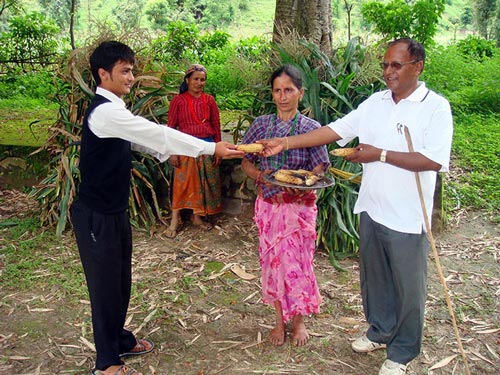
By Dilli KC/CIMMYT
Beginning in August, the Hill Maize Research Project (HMRP-IV), has worked with the Seed Entrepreneurs Association of Nepal and the District Agriculture Development Office to facilitate formal contracts between 51 community-based seed production (CBSP) groups and 25 seed buyers/traders for a total of 201 tons of improved seed of different maize varieties. Of the total contracted seed, seed companies account for 55 percent; agrovets, 20 percent; community seed banks, 13 percent; and cooperatives, 12 percent.
Launched in 1999, HMRP is in its fourth phase. The project focuses on improving the food security and income of resource-poor farm households in the hills of Nepal by raising the productivity, sustainability and profitability of maize-based cropping systems. Work now covers 20 hill districts of Nepal and is jointly funded by the Swiss Agency for Development and Cooperation (SDC) and the United States Agency for International Development (USAID). CIMMYT implements the project in partnership with an array of public and private sector institutions in Nepal. Principal partners include the National Maize Research Program under the Nepal Agricultural Research Council, the Crop Development Directorate under the Department of Agriculture, the Seed Quality Control Centre and the National Seed Board under the Ministry of Agriculture Development. Other partners include community-based organizations, farmer groups, NGOs, private entrepreneurs, seed companies and universities.
Community Based Maize Seed Production
The project began multiplying seed of improved maize varieties through CBSP groups in 2000. That year, about 14 tons of improved maize seed were produced by seven CBSP groups. By 2011, more than 1,140 tons of improved maize seed were produced by 195 CBSP groups and, in 2012, 207 groups produced 1,036 tons. Of the total marketable surplus seed produced in 2011, about 75.1 percent was marketed or exchanged, compared to 83.3 percent in 2012. The seed was marketed mainly across the 20 hill districts of the HMRP project area. Seed production through CBSP groups has been a successful model in Nepal and has contributed to increasing the adoption of improved maize varieties and technologies. The CBSP model helps ensure the availability of improved maize seed in remote hill areas on time at lower prices.
Pre-sowing seed contract
Maize seed marketing is one of HMRP’s major challenges. Until 2012, CBSP groups did not consider the supply and demand in markets, resulting in surplus seed in some areas and deficits in others. The 2013 project phase initiated pre-sowing seed contracts for improved maize varieties, assisting and guiding CBSP groups and seed buyers/traders (agrovets, community seed bank cooperatives and seed companies) to sign formal agreements.
 Nutrition, health and food security
Nutrition, health and food security